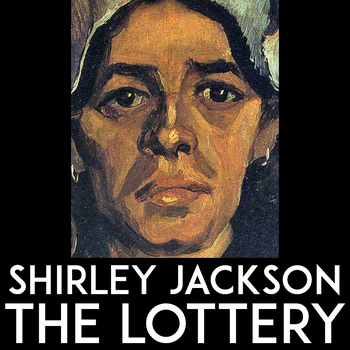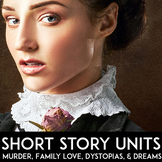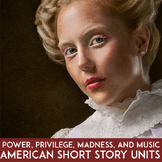Dystopian Short Story: The Lottery Shirley Jackson | Lesson Plans | Bullying
- Zip
- Google Apps™
- Internet Activities

Also included in
- Want to empower your students to take charge of their own educations? So many short story resources involve nothing more than checking boxes or filling out pages of meaningless worksheets. This kind of busywork might seem convenient, but it doesn’t teach students any skills that they need. In fact,Price $41.97Original Price $83.37Save $41.40
- Are you worried your American Literature curriculum doesn’t give your students the challenges and support they need to reach their full potential? So many ready-to-go curriculum packages involve meaningless busywork that is both boring and irrelevant for your classes. It might seem convenient, butPrice $39.97Original Price $76.95Save $36.98
Description
Looking for a complete unit on “The Lottery” that will challenge and inspire your students to make a difference in today's troubled times?
By making connections among bullying, genocide, the Nuremberg trials, Stanley Milgrim’s obedience study, and a classic poem about the Holocaust, your students will be inspired to take their study of Jackson’s powerful story past the pages of the text.
When you teach “The Lottery” with this unit you will:
- be sure that your students won’t miss any of the important elements of the story when they utilize the comprehensive handout of close reading questions
- engage your classes in a critical thinking by using the no-prep prompts for classroom discussion
- challenge your classes to become more aware of injustices in their own time when they make the connection between schoolyard bullying and genocide
- easily teach the unit online using the ready-to-go instructions, links, handouts, and forms all optimized for Google Classroom.
- add depth and breadth to your lesson plans with the paired texts including a poem and a TED Talk
- help your students to more fully comprehend challenging literary concepts such as setting, dialogue, and point of view with the fun, creative activities
- easily discuss the questions for close reading and discussion by utilizing the extensive answer keys
- get your students past writers’ block with the inspiring writing prompts and creative writing activities
- challenge your students to think about the role that they play in preventing further atrocities
- teach a unit on “The Lottery” that your students won’t soon forget
Pairings: This unit would make a great introduction to any texts on dystopian societies, the Holocaust, or genocide including The Hunger Games, The Giver, Fahrenheit 451, 1984, Divergent, Night, or The Diary of Anne Frank.
Read on below for more detail about the engaging lessons that you will employ when you teach with this innovative unit.
First, your classes will read the story without any introduction, so they can feel the full impact of Jackson’s shocking ending.
Then they’ll complete a close reading of the story using the scaffolded questions included in this resource. With a nice combination of more straightforward comprehension questions, deeper close reading questions, and broader thematic discussions, these questions will help your classes to appreciate and understand the story better. The extensive answer keys will help you to discuss the answers with the classes as well as to point them in the right direction when they’re having trouble answering the questions.
Next, they’ll broaden and deepen their exploration of the essential questions of the story by working through 14 different bellringer freewrites about their own experiences, the poem “First They Came” by Pastor Martin Niemoller, a fascinating TED Talk about bullying, hate crimes, and genocide, and more engaging videos on scapegoating and the “following orders” defense first brought up in the Nuremberg trials.
Then, when they complete the fun, rigorous creative writing exercises focusing on setting, dialogue, and point of view, students will both understand and appreciate the story on a deeper level and improve their own close reading and writing skills.
Finally, students will bring it all together in a socratic seminar which you will easily observe and grade using the rubric.
Want to know what you’ll get when you purchase this resource? Click on the preview to see it in its entirety.
There are no lectures or power points here—students will do the work themselves, with guidance from you. Rather than telling them what the texts mean, you will be empowering them with the confidence and skills to tackle challenging work on their own.







